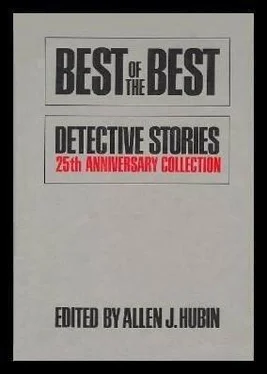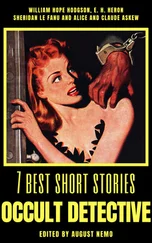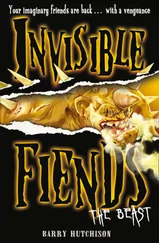Stephen Barr - Best of the best detective stories - 25th anniversary collection
Здесь есть возможность читать онлайн «Stephen Barr - Best of the best detective stories - 25th anniversary collection» весь текст электронной книги совершенно бесплатно (целиком полную версию без сокращений). В некоторых случаях можно слушать аудио, скачать через торрент в формате fb2 и присутствует краткое содержание. Город: New York, Год выпуска: 1971, ISBN: 1971, Издательство: E.P. Dutton & Co., Жанр: Детектив, на английском языке. Описание произведения, (предисловие) а так же отзывы посетителей доступны на портале библиотеки ЛибКат.
- Название:Best of the best detective stories: 25th anniversary collection
- Автор:
- Издательство:E.P. Dutton & Co.
- Жанр:
- Год:1971
- Город:New York
- ISBN:978-0-525-06450-3
- Рейтинг книги:5 / 5. Голосов: 1
-
Избранное:Добавить в избранное
- Отзывы:
-
Ваша оценка:
- 100
- 1
- 2
- 3
- 4
- 5
Best of the best detective stories: 25th anniversary collection: краткое содержание, описание и аннотация
Предлагаем к чтению аннотацию, описание, краткое содержание или предисловие (зависит от того, что написал сам автор книги «Best of the best detective stories: 25th anniversary collection»). Если вы не нашли необходимую информацию о книге — напишите в комментариях, мы постараемся отыскать её.
Best of the best detective stories: 25th anniversary collection — читать онлайн бесплатно полную книгу (весь текст) целиком
Ниже представлен текст книги, разбитый по страницам. Система сохранения места последней прочитанной страницы, позволяет с удобством читать онлайн бесплатно книгу «Best of the best detective stories: 25th anniversary collection», без необходимости каждый раз заново искать на чём Вы остановились. Поставьте закладку, и сможете в любой момент перейти на страницу, на которой закончили чтение.
Интервал:
Закладка:
“I don’t understand.”
“You remember what the ambulance interne told us,” Blanchard said. “Crane was raving about being kept alive by something so he could avenge his sweetheart’s murder. He lived just long enough to do it.”
Dr. Rowland sniffed. “Nonsense! Crane wasn’t the first man I’ve seen alive who by all laws of medical science should be dead. This is especially true where brain injuries are concerned.”
“Maybe.” Blanchard studied the cloud of smoke he expelled. “You’re the doctor, so why should I argue?”
~ ~ ~
A. A. Milne (1882–1956) is best known as the creator of Winnie-the-Pooh, but he is also fondly remembered as the author of The Red House Mystery (1922), at least a minor classic, and a handful of excellent short stories — like this wry and, I venture, unguessable account from the 1947 anthology.
A. A. Milne
The Wine Glass [2] Copyright by Hearst Magazines, Inc. Reprinted by permission of the Estate of A. A. Milne.
I am in a terrible predicament, as you will see directly. I don’t know what to do...
“One of the maxims which I have found most helpful in my career at Scotland Yard,” the superintendent was saying, “has been the simple one that appearances are not always deceptive. A crime may be committed exactly as it seems to have been committed and exactly as it was intended to be committed.” He helped himself and passed the bottle.
“I don’t think I follow you,” I said, hoping thus to lead him on.
I am a writer of detective stories. If you have never heard of me, it can only be because you don’t read detective stories. I wrote “Murder on the Back Stairs” and “The Mystery of the Twisted Eglantine,” to mention only two of my successes. It was this fact, I think, which first interested Superintendent Frederick Mortimer in me, and, of course, me in him. He is a big fellow with the face of a Roman Emperor; I am the small neat type. We gradually became friends and so got into the habit of dining together once a month. He liked talking about his cases, and naturally I liked listening. But this evening the wine seemed to be making itself felt.
“I don’t think I follow you,” I said again.
“I mean that the simple way of committing a murder is often the best way. This doesn’t mean that the murderer is a man of simple mind. On the contrary. He is subtle enough to know that the simple solution is too simple to be credible.”
This sounded anything but simple, so I said, “Give me an example.”
“Well, take the case of the bottle of wine which was sent to the Marquis of Hedingham on his birthday. Have I never told you about it?”
“Never,” I said, and I helped myself and passed the bottle.
He filled his glass and considered. “Give me a moment to get it clear,” he said. “It was a long time ago.” While he closed his eyes and let the past drift before him, I ordered up another bottle of the same.
“Yes,” said Mortimer, opening his eyes. “I’ve got it now.”
I leaned forward, listening eagerly. This is the story he told me.
The first we heard of it at the Yard (said Mortimer) was a brief announcement over the telephone that the Marquis of Hedingham’s butler had died suddenly at His Lordship’s town house in Brook Street, and that poison was suspected. This was at seven o’clock. We went around at once. Inspector Totman had been put in charge of the case; I was a young detective sergeant at the time, and I generally worked under Totman. He was a brisk, military sort of fellow, with a little prickly ginger mustache, good at his job in a showy, orthodox way, but he had no imagination, and he was thinking all the time of what Inspector Totman would get out of it. Quite frankly I didn’t like him. Outwardly we kept friendly, for it doesn’t do to quarrel with one’s superiors; indeed, he was vain enough to think that I had a great admiration for him; but I knew that he was just using me for his own advantage, and I had a shrewd suspicion that I should have been promoted before this, if he hadn’t wanted to keep me under him so that he could profit by my brains.
We found the butler in his pantry, stretched out on the floor. An open bottle of Tokay, a broken wine glass with the dregs of the liquid still in it, the medical evidence of poisoning, all helped to build up the story for us. The wine had arrived about an hour before, with the card of Sir William Kelso attached to it. On the card was a typewritten message, saying, “Bless you, Tommy, and here’s something to celebrate with.” I can’t remember the exact words, of course, but that was the idea. Apparently it was His Lordship’s birthday, and he was having a small family party of about six people for the occasion. Sir William Kelso, I should explain, was his oldest friend and a relation by marriage. Lord Hedingham having married his sister; in fact. Sir William was to have been one of the party present that evening. He was a bachelor, about fifty, and a devoted uncle to his nephew and nieces.
Well, the butler had brought up the bottle and the card to His Lordship — this was about six o’clock; and Lord Hedingham, as he told us, had taken the card, said something like, “Good old Bill. We’ll have that tonight, Perkins,” and Perkins had said, “Very good. My Lord,” and gone out again with the bottle. The card had been left lying on the table. Afterwards there could be little doubt what had happened. Perkins had opened the bottle with the intention of decanting it but had been unable to resist the temptation to sample it first. I suspect that in his time he had sampled most of His Lordship’s wine but had never before come across a Tokay of such richness. So he had poured himself out a full glass, drunk it, and died almost immediately.
“Good heavens!” I interrupted. “But how extremely providential — I mean, of course, for Lord Hedingham and the others.”
“Exactly,” said Mortimer, as he twirled his own wine glass. The contents of the bottle were analyzed (he went on) and found to contain a more-than-fatal dose of prussic acid. Of course we did all the routine things. With young Roberts, a nice young fellow who often worked with us, I went around to all the chemists’ shops in the neighborhood. Totman examined everybody from Sir William and Lord Hedingham downwards.
Roberts and I took the bottle round to all the wine merchants in the neighborhood. At the end of a week all we could say was this:
One: The murderer had a motive for murdering Lord Hedingham; or, possibly, somebody at his party; or, possibly, the whole party. In accordance with the usual custom. His Lordship would be the first to taste the wine. A sip would not be fatal, and in a wine of such richness the taste might not be noticeable; so that the whole party would then presumably drink His Lordship’s health. He would raise his glass to them, and in this way they would all take the poison, and be affected according to how deeply they drank. On the other hand, His Lordship might take a good deal more than a sip in the first place, and so be the only one to suffer. My deduction from this was that the motive was revenge rather than gain. The criminal would avenge himself on Lord Hedingham if His Lordship or any of his family were seriously poisoned; he could only profit if definite people were definitely killed. It took a little time to get Totman to see this, but he did eventually agree.
Two: The murderer had been able to obtain one of Sir William Kelso’s cards, and knew that John Richard Mervyn Plantaganet Carlow, tenth Marquis of Hedingham, was called “Tommy” by his intimates. Totman deduced from this that he was therefore one of the Hedingham-Kelso circle of relations and friends. I disputed this. I pointed out: (a) that it was to strangers rather than to intimate friends that cards were presented, except in the case of formal calls, when they were left in a bowl or tray in the hall, and anybody could steal one; (b) that the fact that Lord Hedingham was called Tommy must have appeared in society papers and be known to many people; and, most convincing of all, (c) that the murderer did not know that Sir William Kelso was to be in the party that night. For obviously some reference would have been made to the gift, either on his arrival or when the wine was served; whereupon he would have disclaimed any knowledge of it, and the bottle would immediately have been suspected. As it was, of course, Perkins had drunk from it before Sir William’s arrival. Now both Sir William and Lord Hedingham assured us that they always dined together on each other’s birthday, and they were convinced that any personal friend of theirs would have been aware of the fact. I made Totman question them about this, and he then came round to my opinion.
Читать дальшеИнтервал:
Закладка:
Похожие книги на «Best of the best detective stories: 25th anniversary collection»
Представляем Вашему вниманию похожие книги на «Best of the best detective stories: 25th anniversary collection» списком для выбора. Мы отобрали схожую по названию и смыслу литературу в надежде предоставить читателям больше вариантов отыскать новые, интересные, ещё непрочитанные произведения.
Обсуждение, отзывы о книге «Best of the best detective stories: 25th anniversary collection» и просто собственные мнения читателей. Оставьте ваши комментарии, напишите, что Вы думаете о произведении, его смысле или главных героях. Укажите что конкретно понравилось, а что нет, и почему Вы так считаете.












